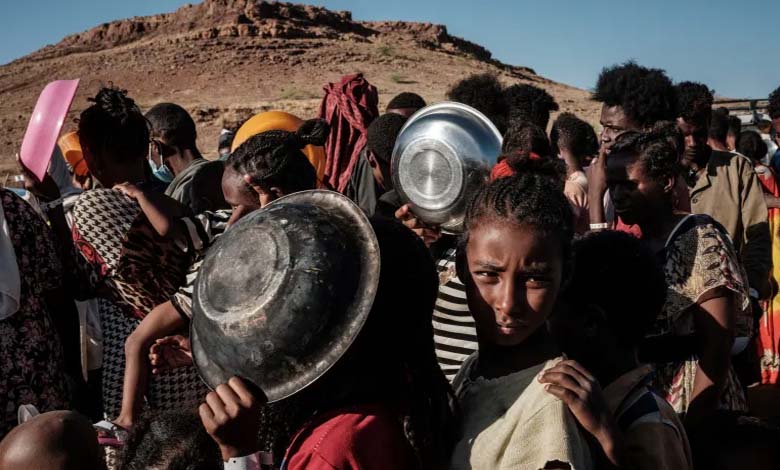Sudanese Analyst: Khartoum Caught Between Fire and Famine… Civil War Exacerbates Human and Economic Suffering

Political and security crises in Sudan remain a significant challenge for the country, as the ongoing armed conflict hampers stabilization efforts and deepens the suffering of the Sudanese people. This report sheds light on the current situation in Sudan, which has been enduring a civil war for over a year between the Sudanese army and the Rapid Support Forces, resulting in multiple crises across social, economic, and humanitarian domains.
-
After the escalation of the conflict, do the crises in Sudan cast their dark shadow on the fragile South?
-
The Economic Situation Collapses in Sudan… War Plunges Khartoum into Major Crises Khartoum has entered a major crisis
Ongoing War and Its Security Impacts
Since April 2023, Sudan has witnessed a bloody conflict between the Sudanese army and the Rapid Support Forces, igniting a civil war between two factions vying for power. Despite negotiation attempts and international mediations, the conflict continues, leading to the deaths of hundreds of thousands, injuries to tens of thousands, and the displacement of over 5 million people both inside and outside the country.
Economic Conditions
The war has severely impacted Sudan’s economy. The value of the Sudanese pound has plummeted to unprecedented levels, negatively affecting citizens’ purchasing power and worsening poverty. Markets are also suffering from severe shortages of essential goods such as food and fuel, while prices have soared dramatically.
Moreover, many vital sectors, such as agriculture and industry, have been disrupted due to infrastructure damage caused by military operations, resulting in decreased local production and increased reliance on imports. In this scenario, securing daily necessities has become a major challenge for citizens.
Displacement and Refugee Crisis
The ongoing conflict in Sudan has caused mass displacement of civilians, with many seeking refuge in neighboring countries such as Egypt, Chad, and Ethiopia. Reports indicate that more than 4 million Sudanese have been forced to leave their homes due to the war. This massive influx of refugees places additional strain on host countries, which are compelled to provide humanitarian aid and shelter under challenging conditions.
-
Sudan War: The Flames Encircle El-Fasher from All Sides and ‘Path of Hope’
-
Ethnic Cleansing in Dinder… Humanitarian Tragedy Caused by the Sudanese Army
Humanitarian Challenges
While the Sudanese population suffers from poverty and hunger, the healthcare sector is also on the verge of total collapse. Hospitals and medical facilities have been heavily damaged by military attacks, causing severe shortages of medicines and medical supplies. Numerous humanitarian organizations have warned that Sudan faces a health catastrophe, with a growing number of casualties and deteriorating healthcare services.
Additionally, civilians are suffering due to disruptions in food and medicine supplies and the suspension of many humanitarian projects due to the conflict, making the delivery of aid extremely challenging.
-
Sudan Crisis: What are the Motivations behind the Ministerial Changes and Their Expected Outcomes?
-
Catastrophic Consequences… Millions of Sudanese Children Pay the Price of War. What’s the Story?
Sudanese journalist and political activist Mohamed Al-Tayeb expressed his deep concern about the worsening situation in Sudan, as the ongoing civil war and escalating economic and humanitarian crises plague the country.
Al-Tayeb said: “The situation in Sudan has become catastrophic, with continued armed conflict between rival factions claiming the lives of hundreds of thousands of civilians and displacing millions both internally and externally.”
-
Ongoing Suffering: More than 25 million Sudanese Face the Specter of Famine
-
After 500 Days of War… A Major Health and Food Crisis Facing Sudan
He added that the economic crisis caused by the war has driven many Sudanese to the brink of poverty, with the country experiencing a severe shortage of basic goods and an unprecedented rise in food and fuel prices. He emphasized that this economic crisis is compounded by the collapse of the healthcare system, further increasing citizens’ suffering and complicating access to healthcare for many patients.
Al-Tayeb called for an urgent international response to help Sudan overcome this crisis, urging the international community to provide more humanitarian aid and intensify pressure on warring parties to reach a political agreement that ensures the country’s stability and unity. He said: “We need a comprehensive peaceful solution to end this war and restore hope to millions of Sudanese suffering under these harsh conditions.”
-
Sudan Stuck Between War and Climate Change: Blockades, Diseases, and Drought
-
A Year into Sudan’s War… Suffering Without End
In conclusion, Mohamed Al-Tayeb stressed that the Sudanese people deserve a better life, free from wars and destruction, emphasizing that peace and stability are the only path to saving Sudan from this tragic situation.











